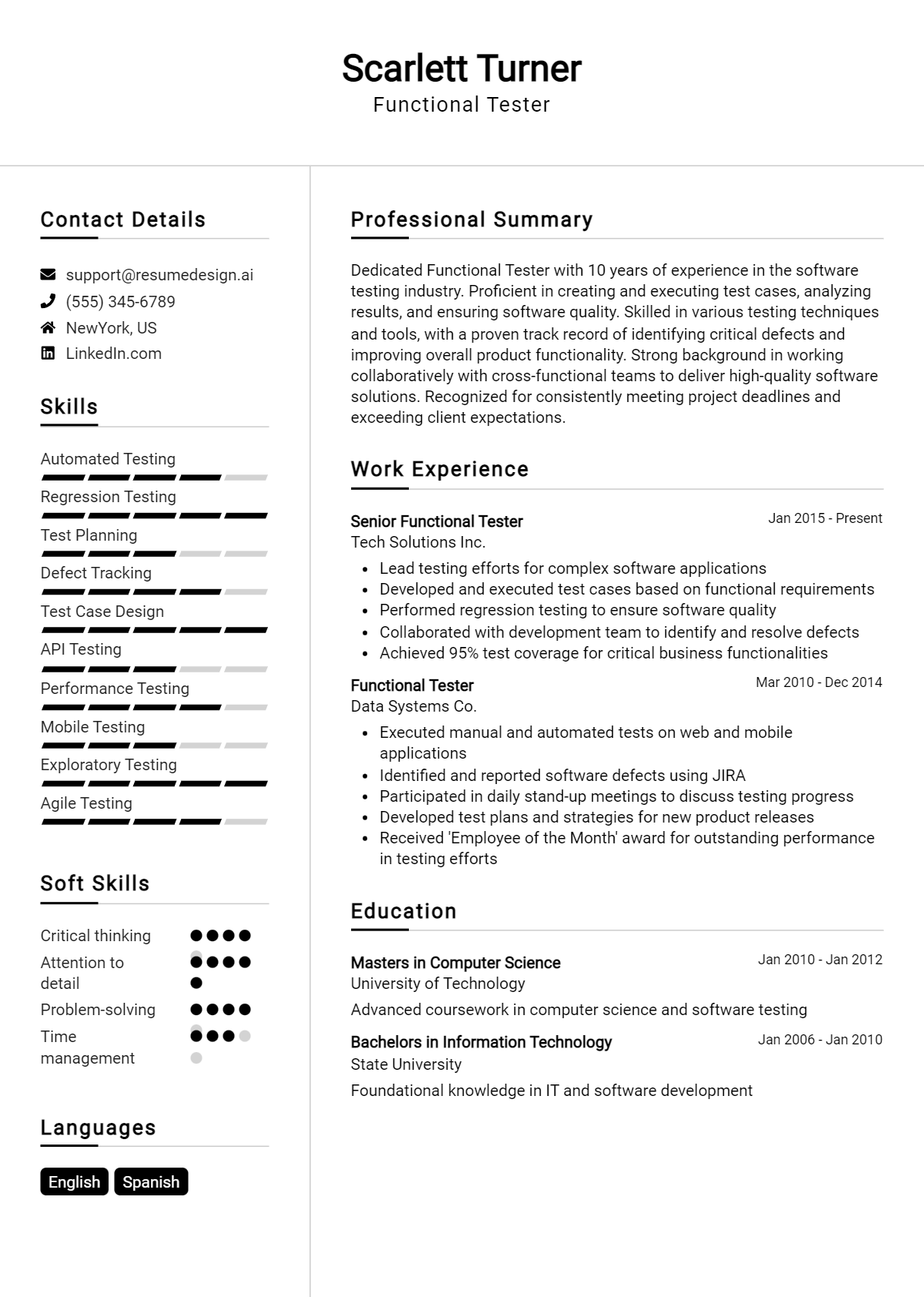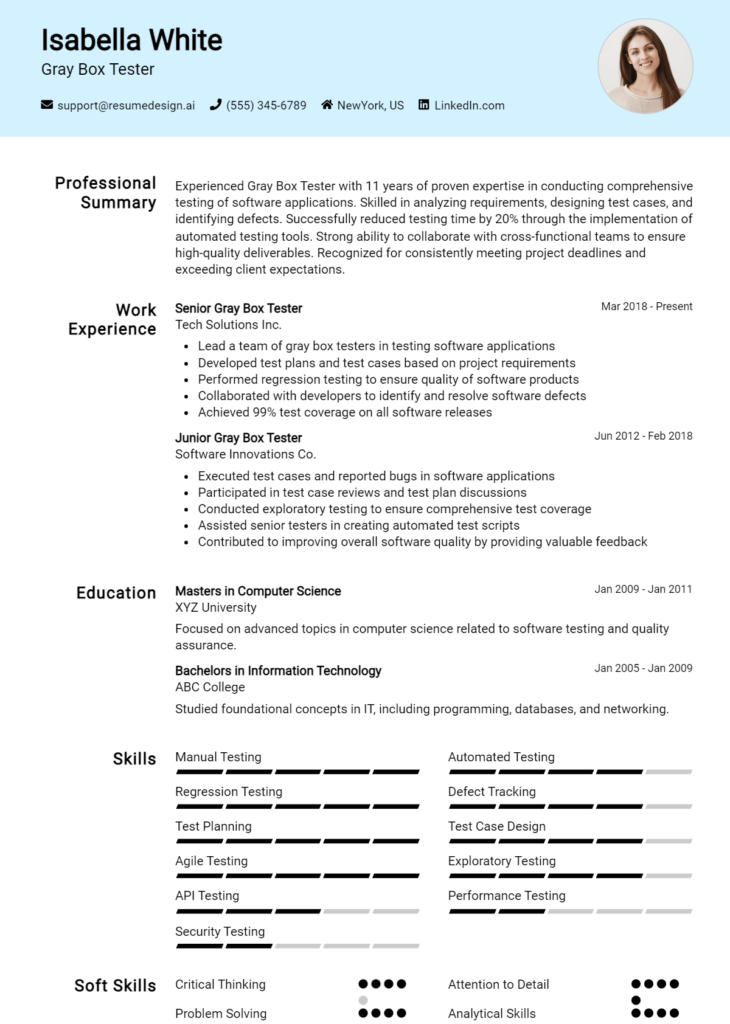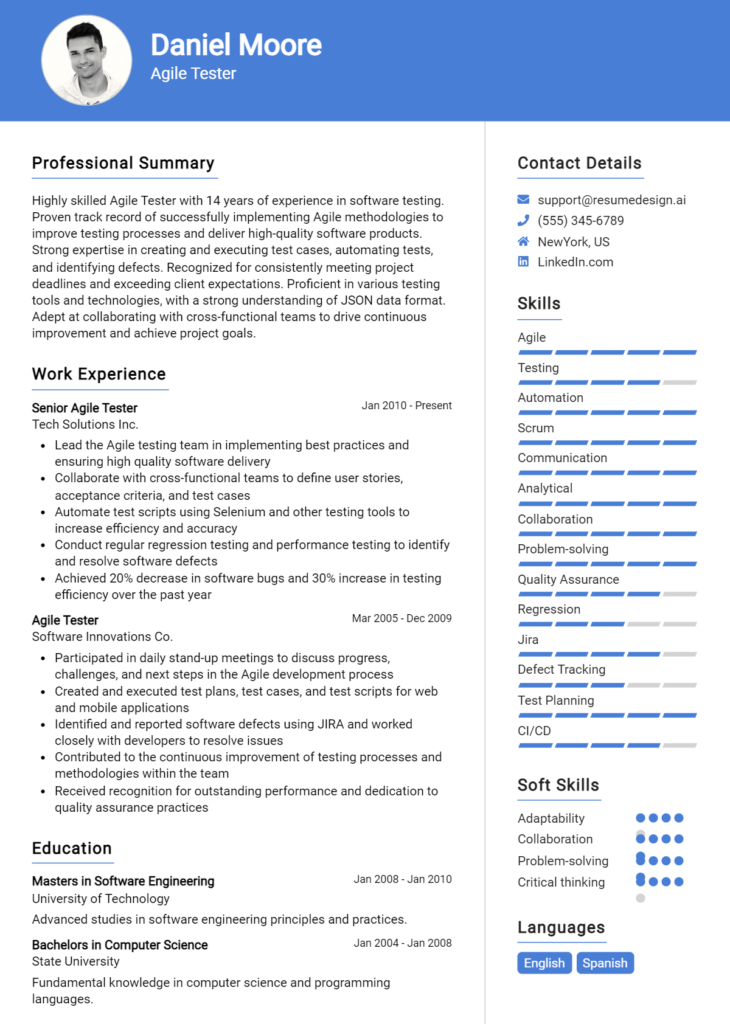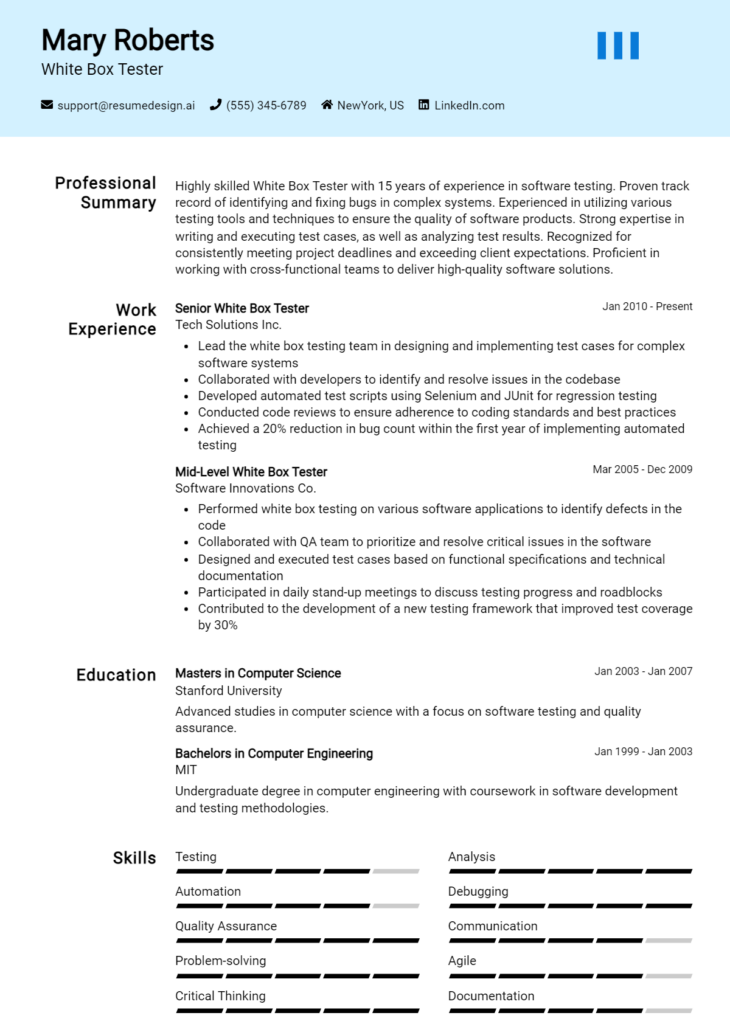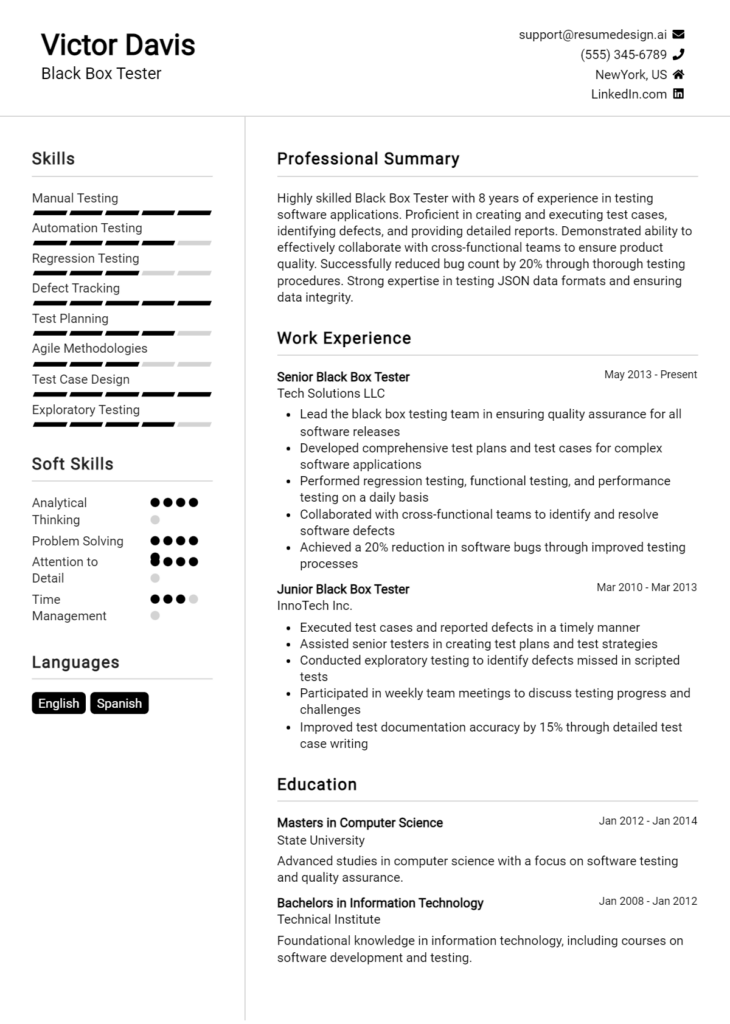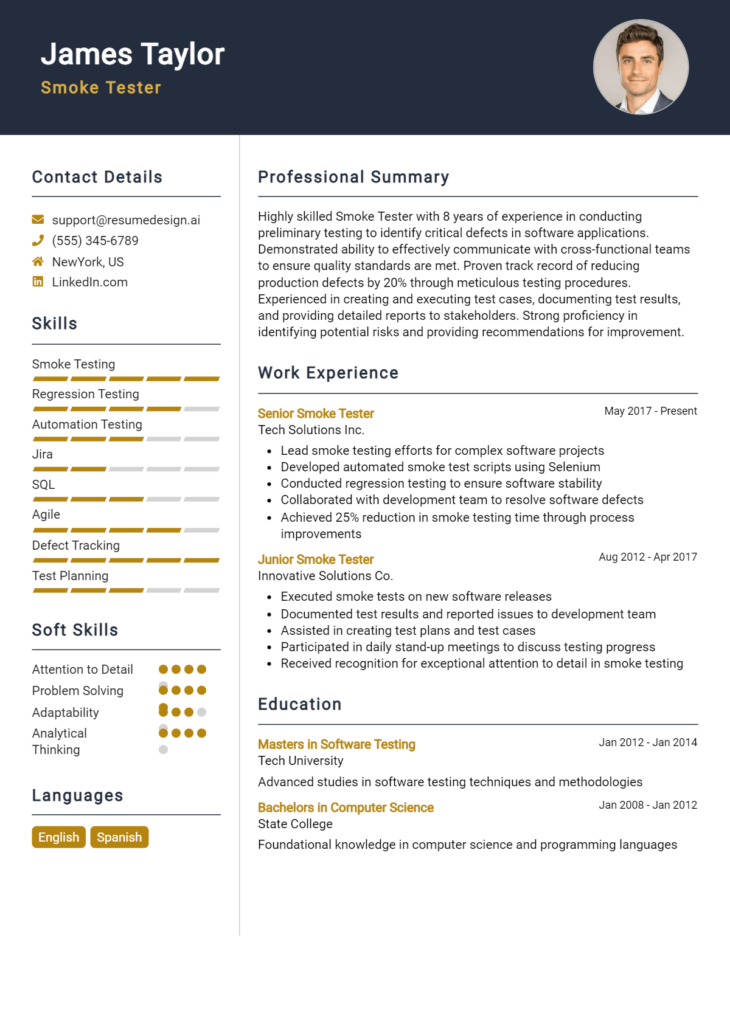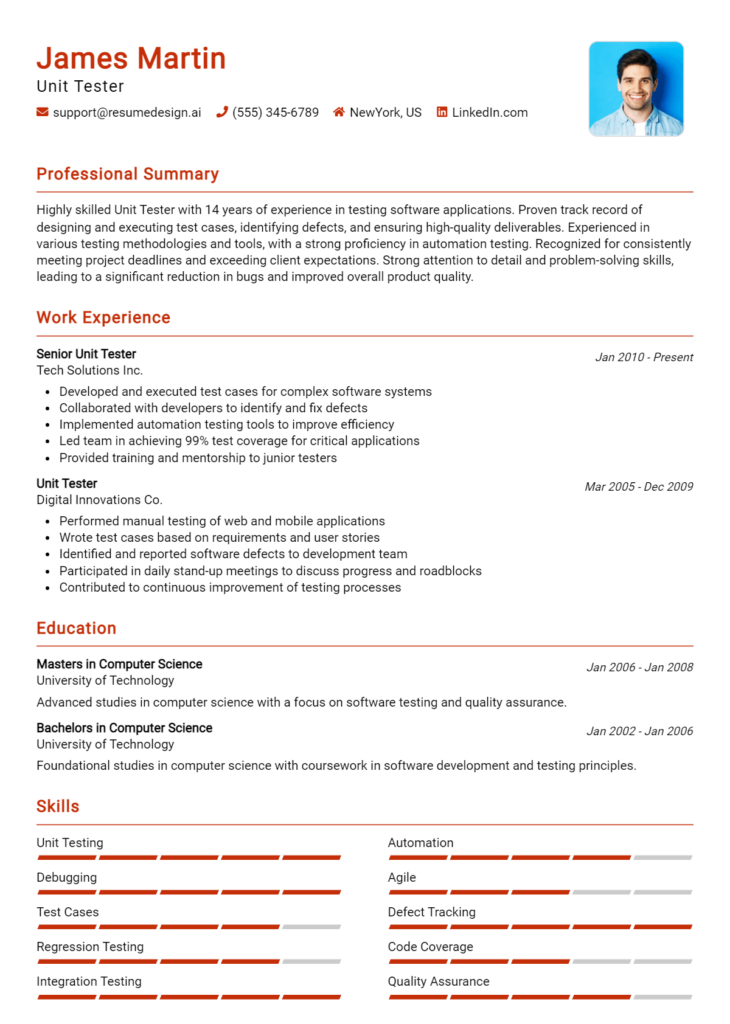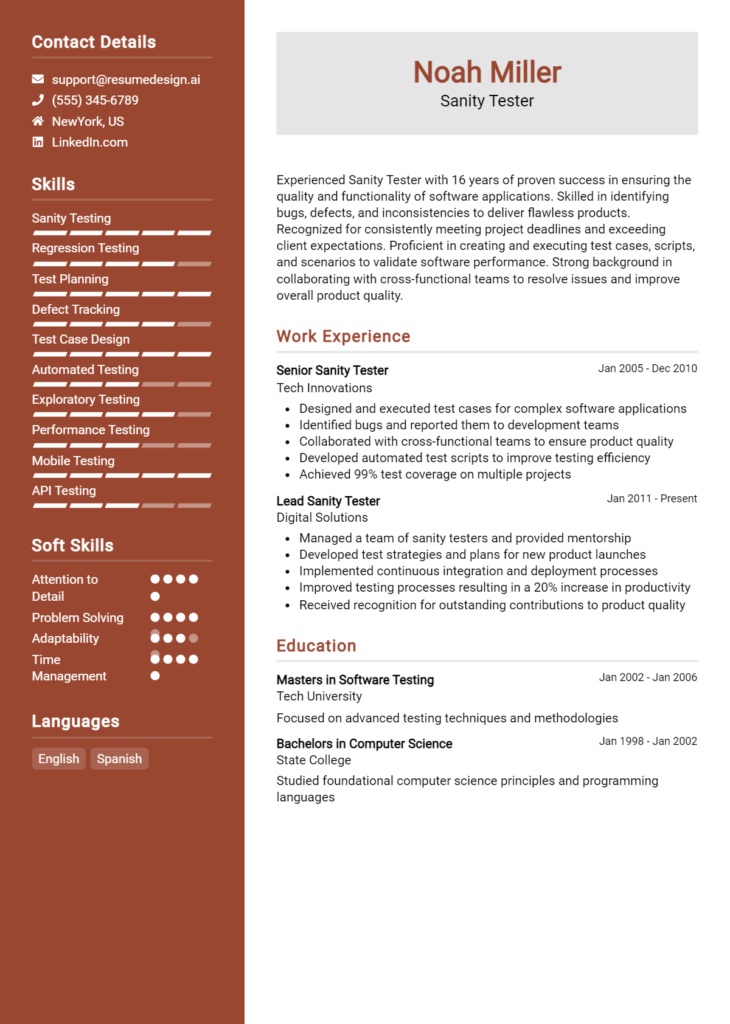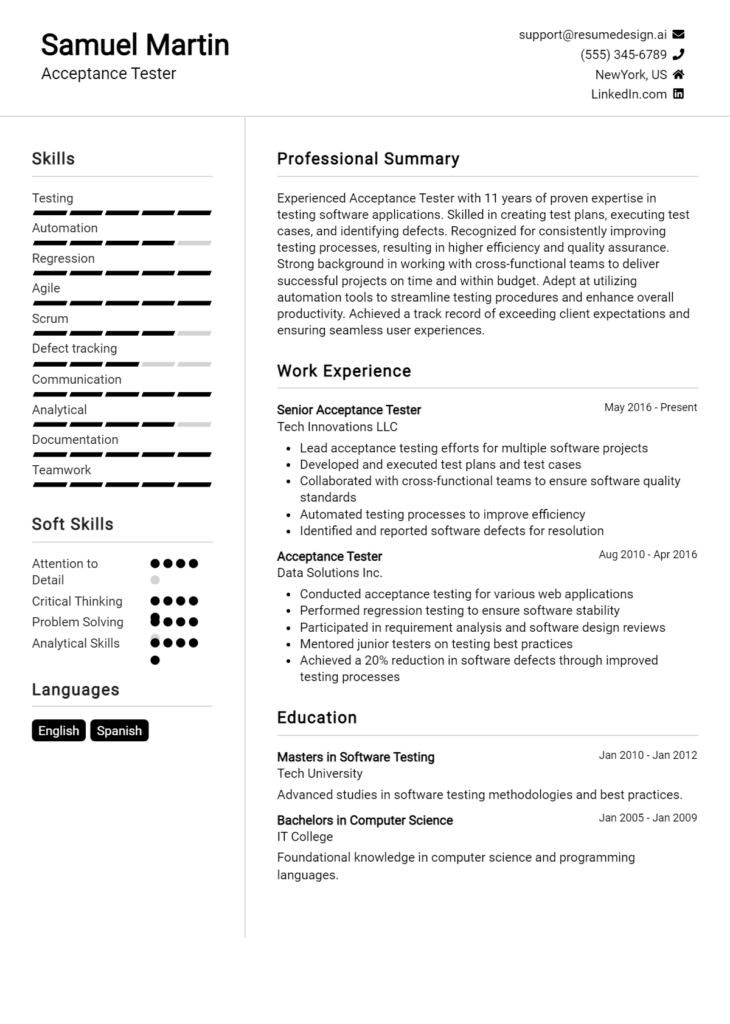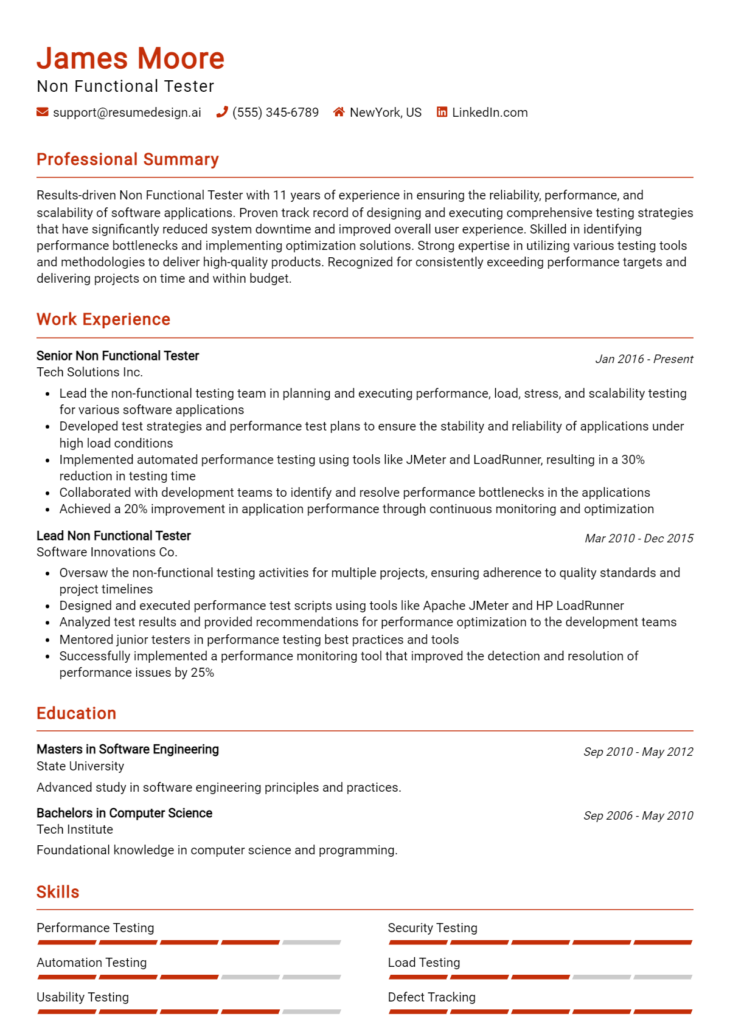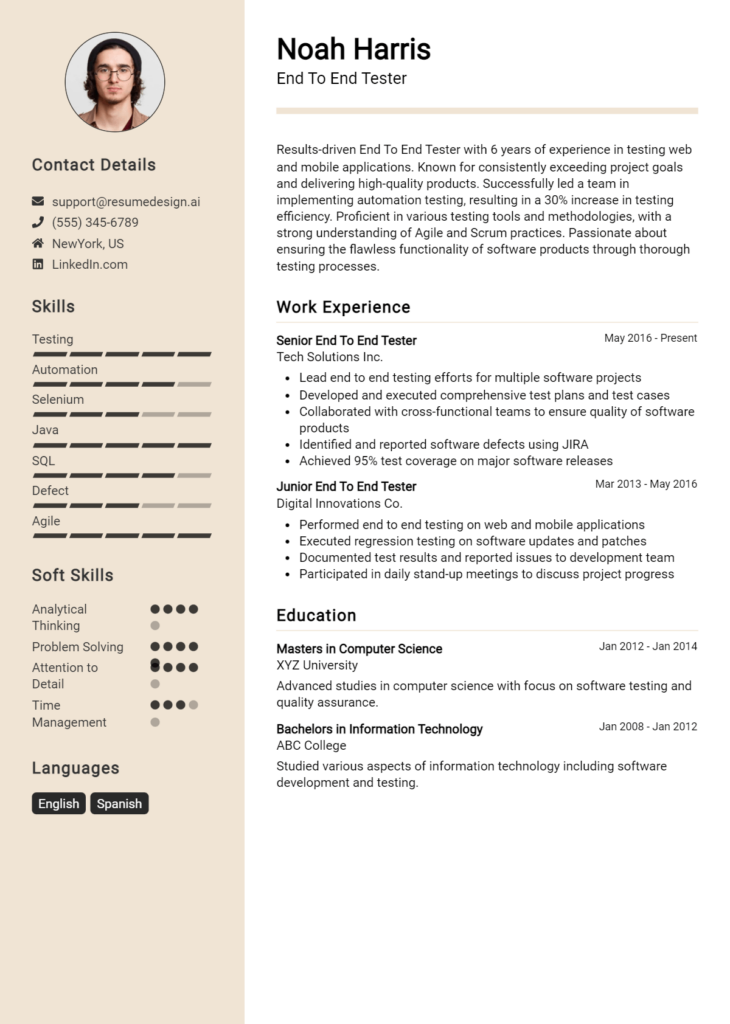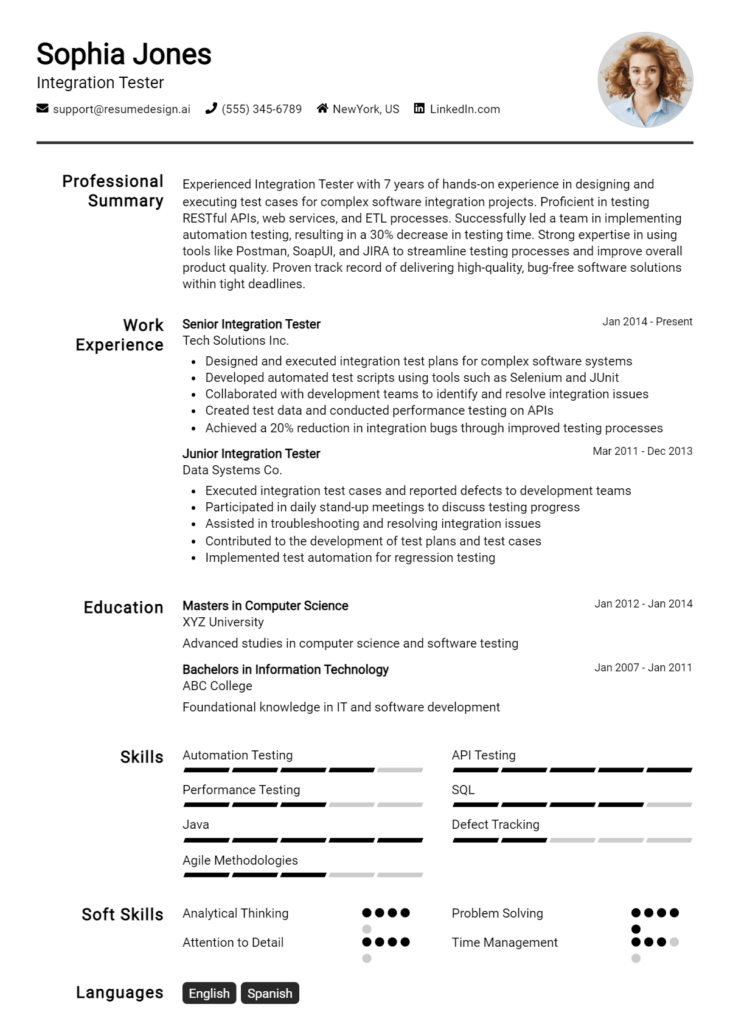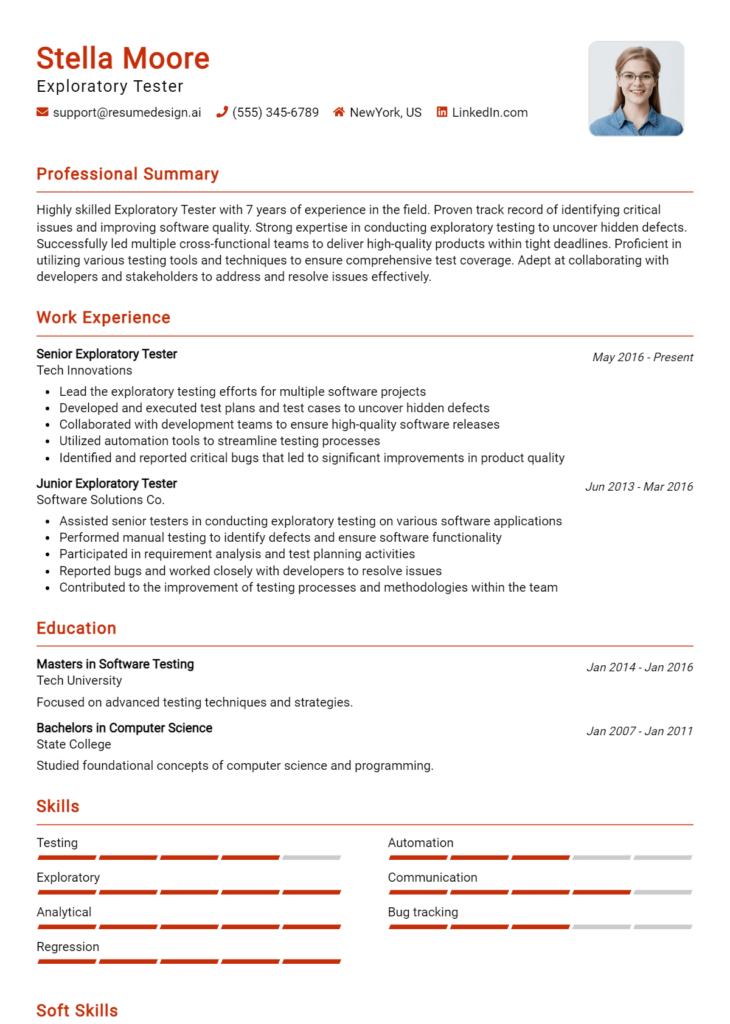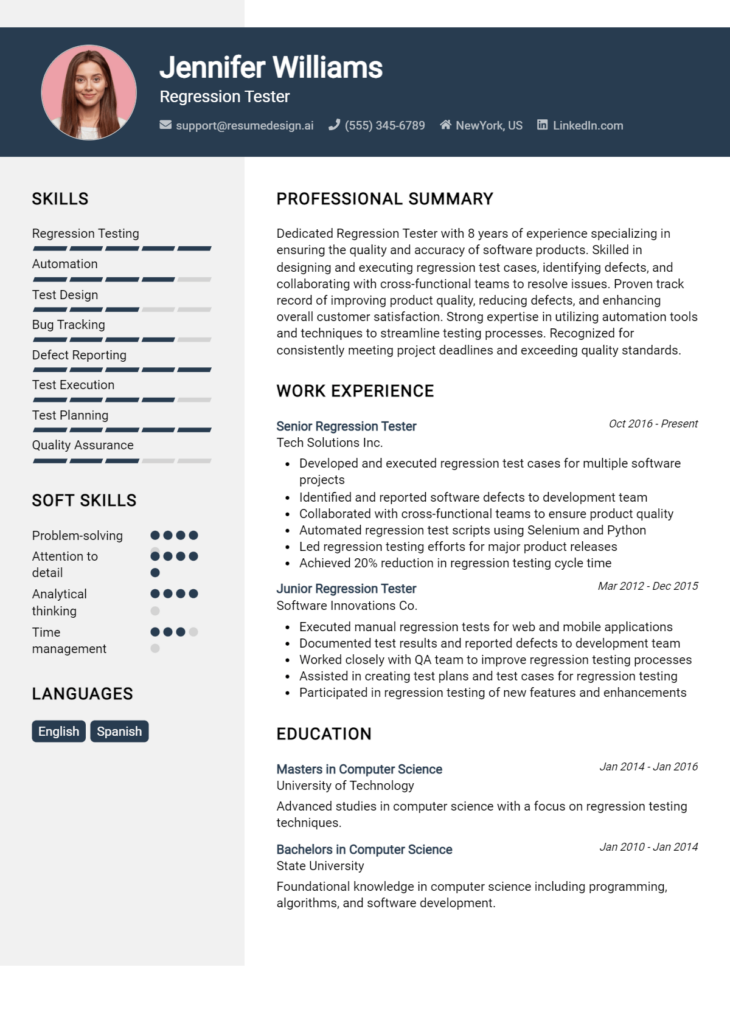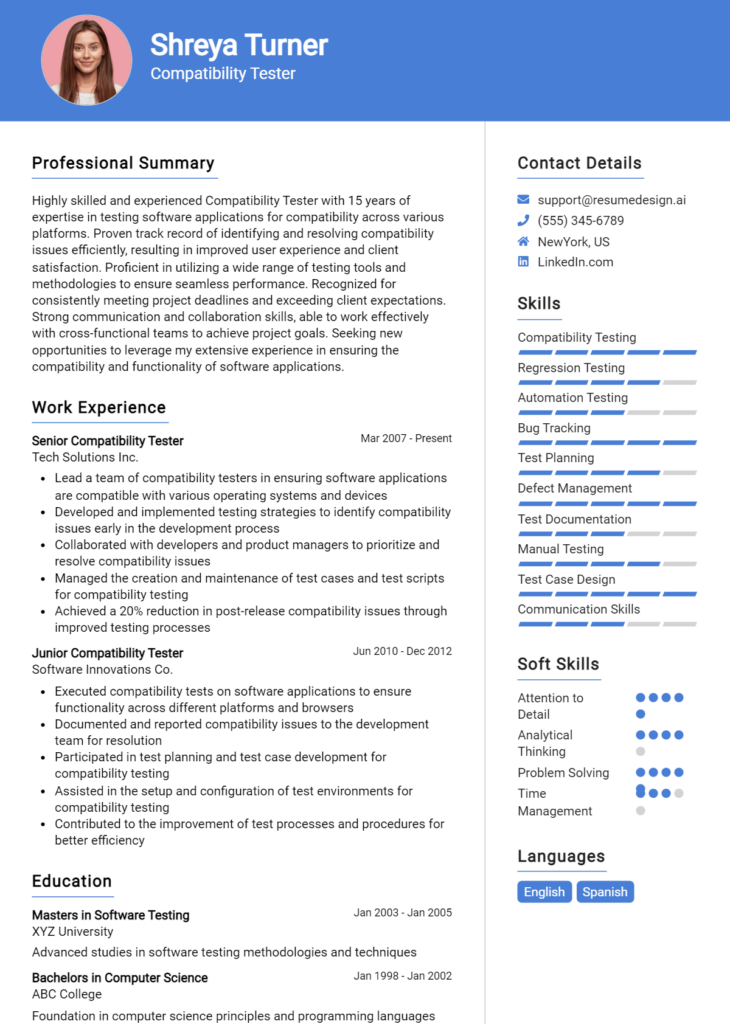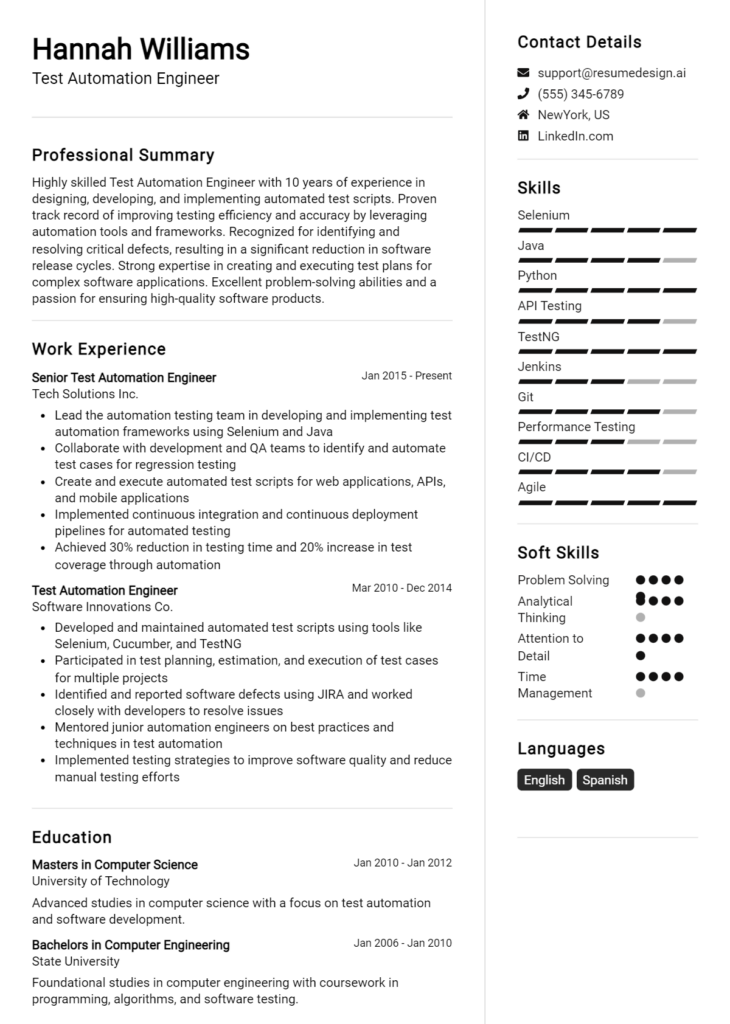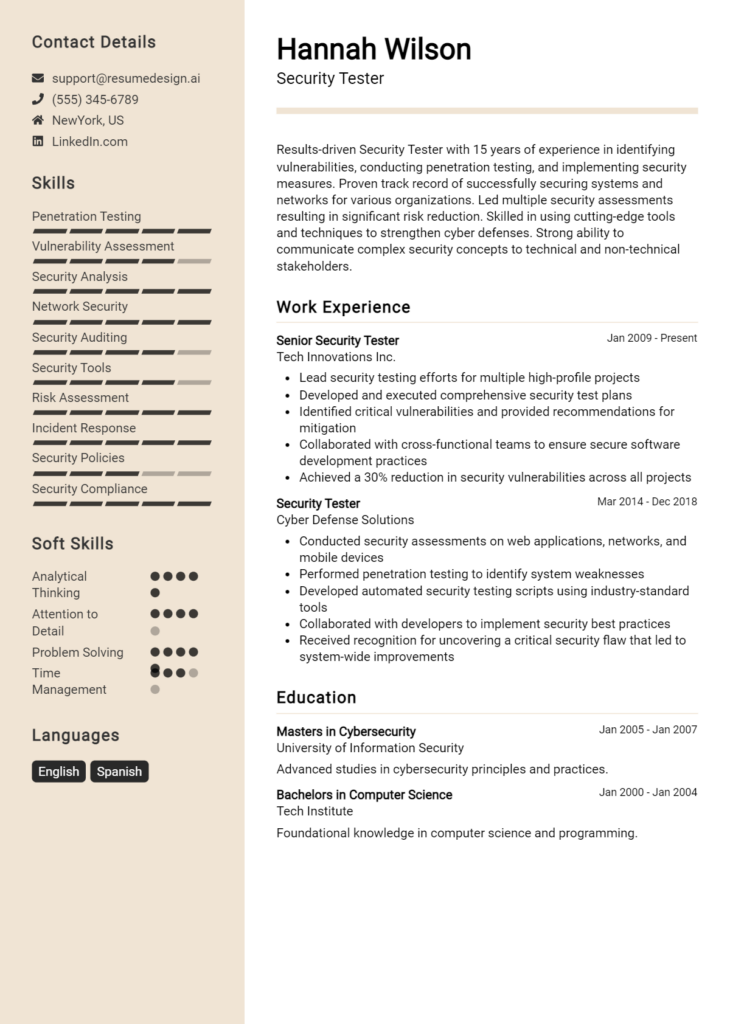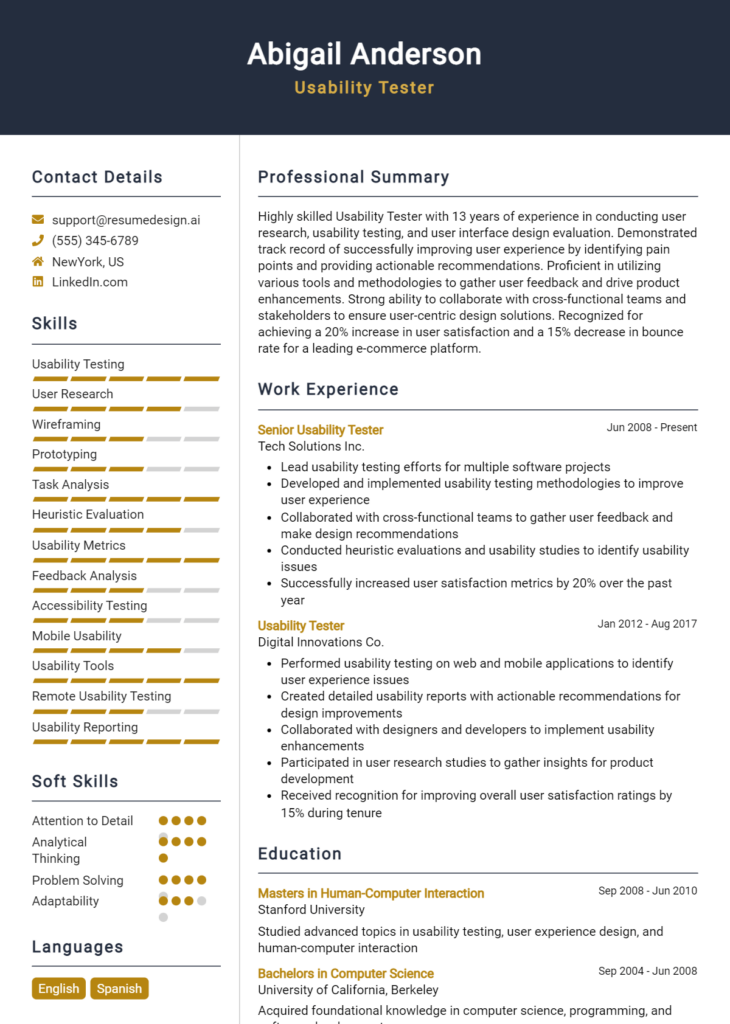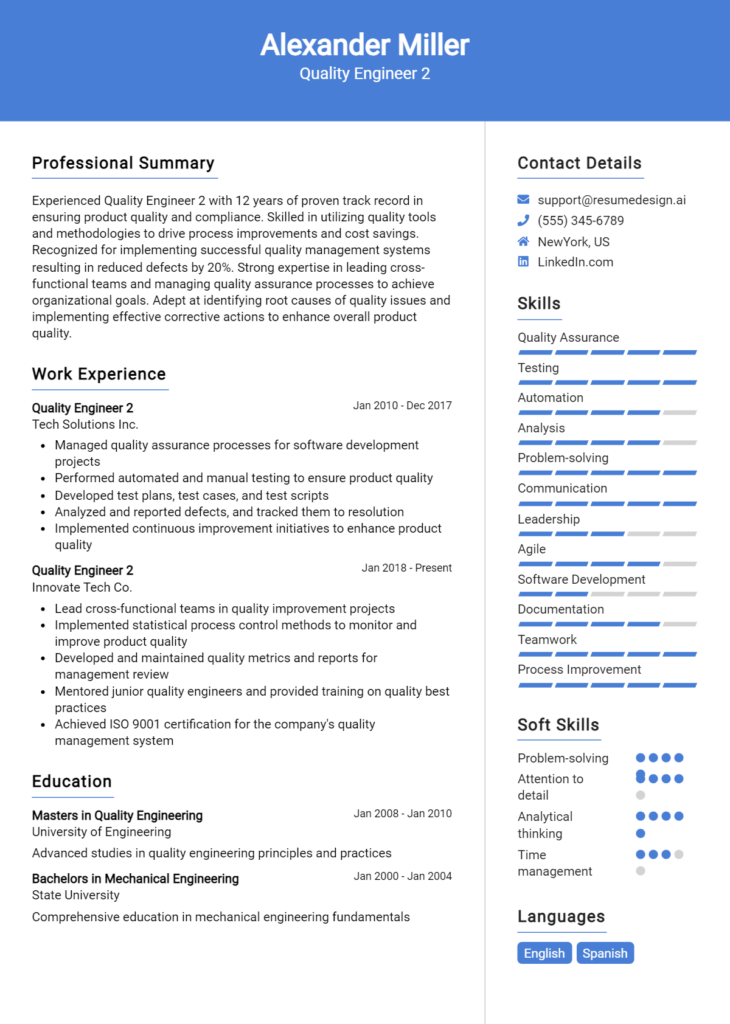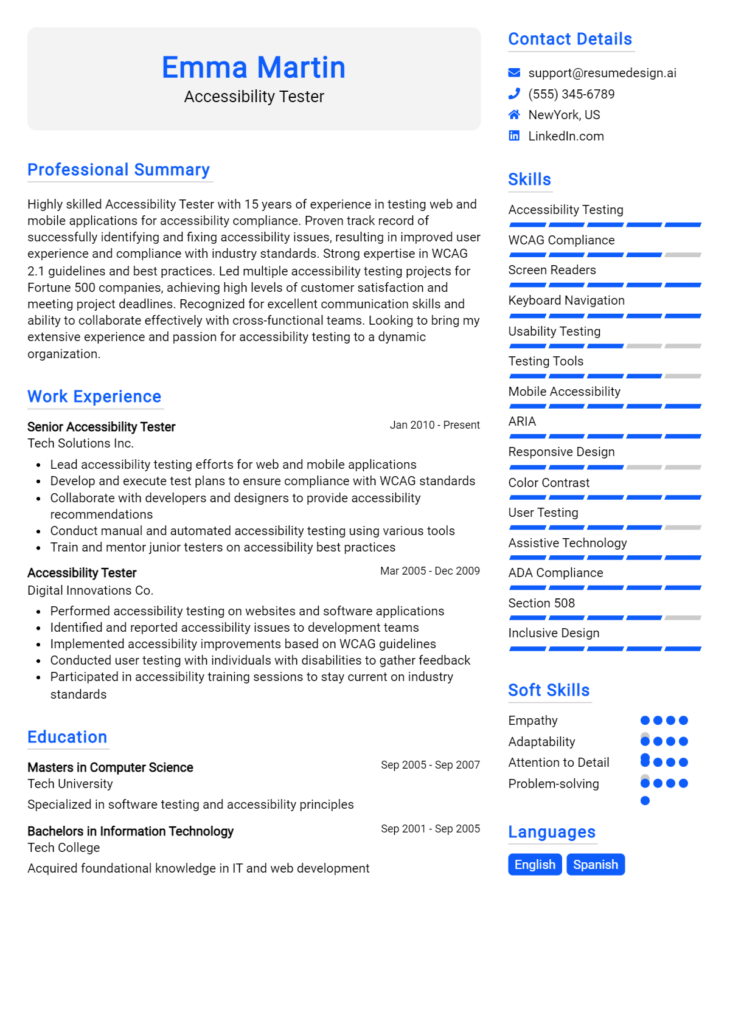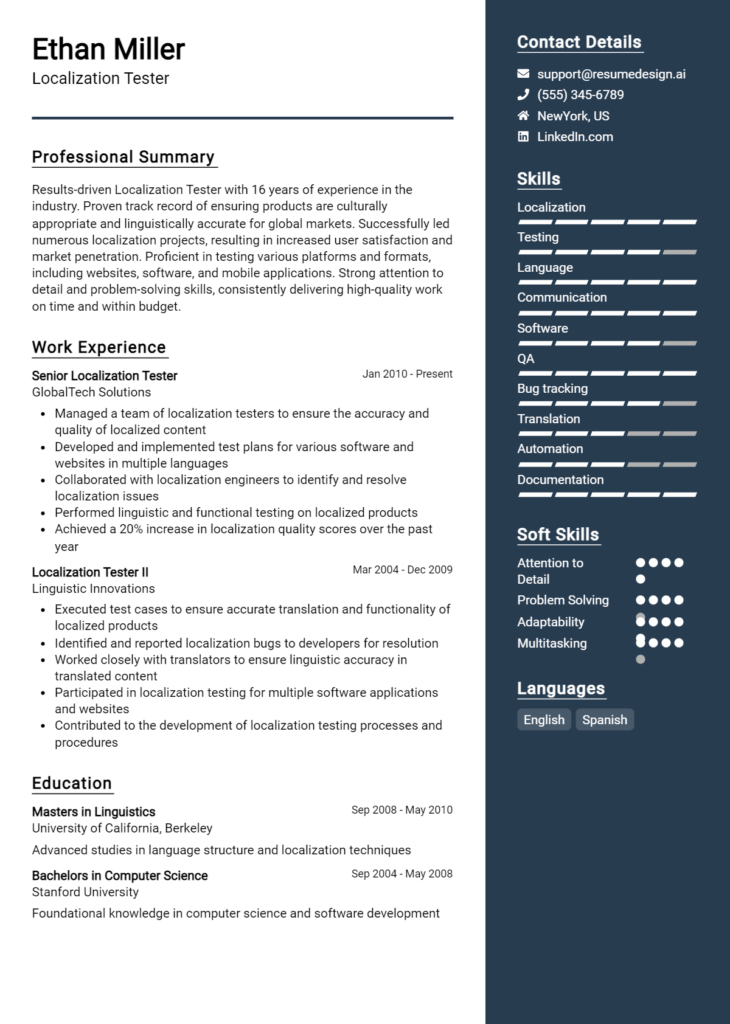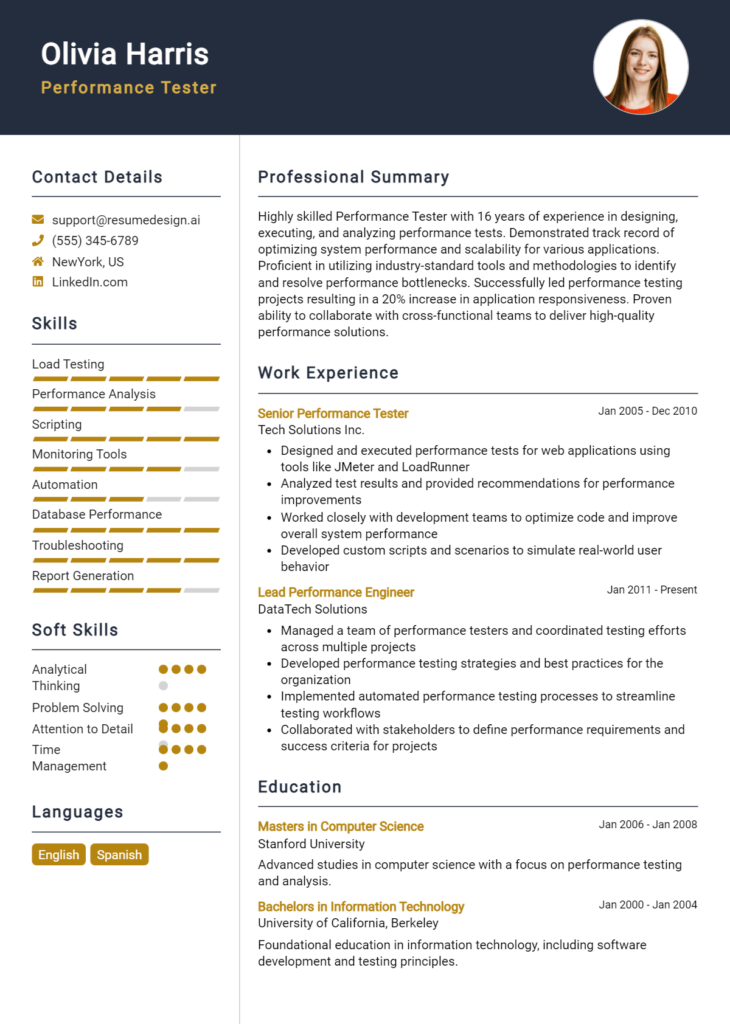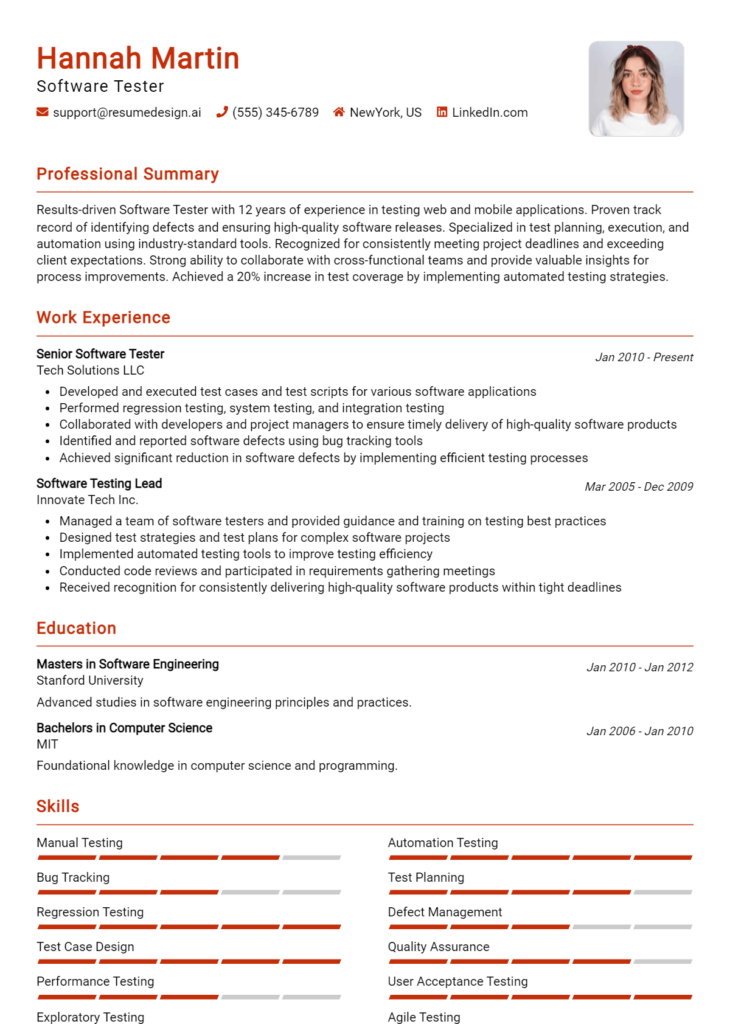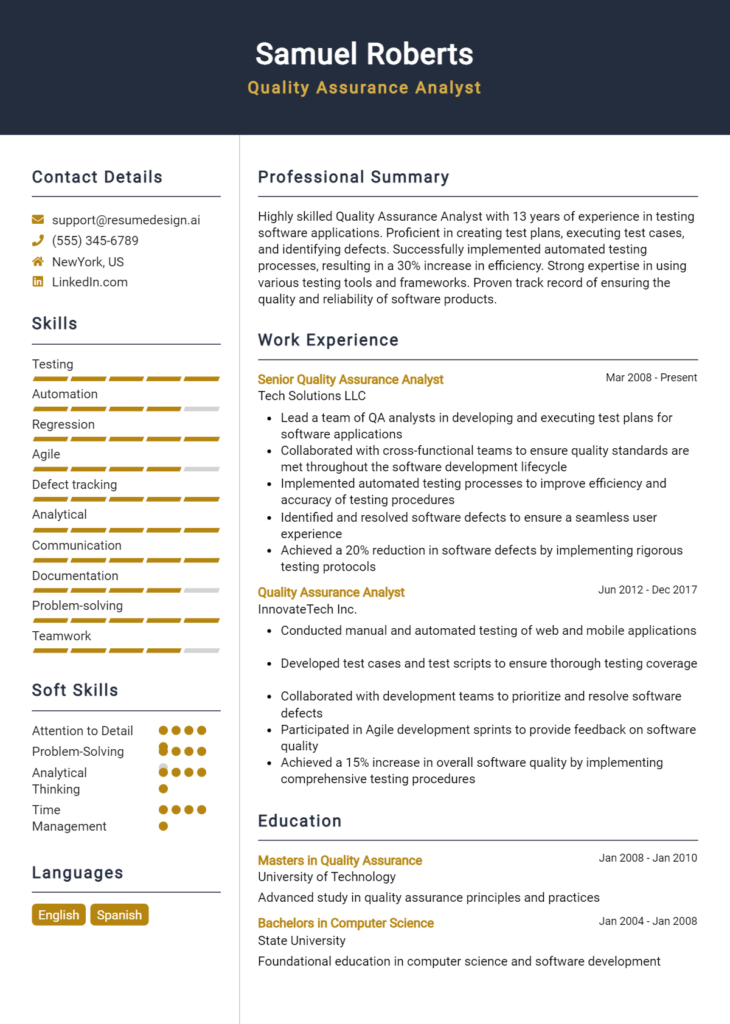Functional Tester Core Responsibilities
A Functional Tester plays a crucial role in ensuring software applications meet specified requirements and function correctly across different platforms. This professional is responsible for executing test cases, documenting results, and collaborating with development and QA teams to address issues. Key skills include technical proficiency in testing tools, operational understanding of software development life cycles, and strong problem-solving abilities. These competencies are vital for enhancing product quality, ultimately contributing to the organization's success. A well-structured resume can effectively highlight these qualifications, showcasing a candidate's value to potential employers.
Common Responsibilities Listed on Functional Tester Resume
- Design and execute detailed test cases based on functional specifications.
- Identify, document, and track software defects using bug tracking tools.
- Collaborate with developers to understand application functionality and requirements.
- Participate in requirement reviews and provide feedback on testability.
- Perform regression testing to ensure existing functionalities remain intact.
- Document and maintain testing procedures and test plans.
- Support user acceptance testing and gather feedback from stakeholders.
- Analyze test results and prepare comprehensive reports for stakeholders.
- Assist in the development of automated test scripts where applicable.
- Ensure compliance with industry standards and best practices in testing.
- Continuously improve testing processes based on feedback and findings.
High-Level Resume Tips for Functional Tester Professionals
A well-crafted resume is crucial for Functional Tester professionals, as it serves as the first impression a candidate makes on potential employers. In a competitive job market, your resume must effectively showcase not only your technical skills but also your achievements and contributions to past projects. It is essential to create a document that reflects your expertise in functional testing, aligns with the specific requirements of the job you are applying for, and demonstrates your value as a potential team member. This guide will provide practical and actionable resume tips specifically tailored for Functional Tester professionals, helping you stand out in your job search.
Top Resume Tips for Functional Tester Professionals
- Tailor your resume to match the job description by using relevant keywords and phrases.
- Highlight your experience with various testing methodologies, such as manual and automated testing.
- Showcase specific tools and technologies you are proficient in, such as Selenium, JIRA, or QTP.
- Quantify your achievements by including metrics, such as defect reduction rates or test case coverage.
- Include a summary statement that succinctly captures your professional background and testing philosophy.
- Demonstrate your problem-solving skills by providing examples of challenges you’ve overcome in previous projects.
- Emphasize your collaboration with cross-functional teams to highlight your communication and teamwork abilities.
- List relevant certifications, such as ISTQB or CSTE, to bolster your credibility in the field.
- Keep the format clean and professional, ensuring easy readability with clear headings and bullet points.
- Proofread your resume multiple times to eliminate any spelling or grammatical errors that could detract from your professionalism.
By implementing these tips, you can significantly increase your chances of landing a job in the Functional Tester field. A polished and tailored resume will not only showcase your qualifications but also demonstrate your commitment to your career, making you a more attractive candidate to potential employers.
Why Resume Headlines & Titles are Important for Functional Tester
In the competitive landscape of job applications, particularly for a Functional Tester role, the importance of resume headlines and titles cannot be overstated. A well-crafted headline serves as the first impression, instantly capturing the attention of hiring managers while summarizing a candidate's key qualifications in a concise and impactful manner. This crucial element should be tailored to reflect the specific job requirements and highlight relevant skills or experiences, ensuring that it resonates with the reader and encourages them to delve deeper into the resume.
Best Practices for Crafting Resume Headlines for Functional Tester
- Keep it concise: Aim for a headline that is brief yet informative, ideally one line long.
- Be role-specific: Use terminology that is relevant to the Functional Tester position to demonstrate your expertise.
- Highlight key skills: Incorporate critical skills or certifications that align with the job description.
- Use strong action words: Begin with powerful verbs that convey your capabilities and achievements.
- Tailor for each application: Customize your headline for each job to reflect the specific requirements and preferences of the employer.
- Focus on accomplishments: If applicable, mention measurable achievements that can set you apart from other candidates.
- Use keywords: Include keywords from the job description to pass through applicant tracking systems (ATS).
- Avoid jargon: Keep language clear and accessible, avoiding overly technical terms that may confuse the reader.
Example Resume Headlines for Functional Tester
Strong Resume Headlines
"Detail-Oriented Functional Tester with 5 Years of Experience in Agile Environments"
“Certified QA Professional Specializing in Automation Testing and User Acceptance Testing (UAT)”
“Results-Driven Functional Tester with Proven Track Record in Reducing Software Defects by 30%”
Weak Resume Headlines
“Tester Looking for Jobs”
“Experienced Professional”
Strong headlines are effective because they provide a clear and compelling snapshot of the candidate's qualifications and strengths, making it easy for hiring managers to recognize their suitability for the role. In contrast, weak headlines fail to impress as they lack specificity, leaving the reader with little understanding of the candidate's unique value or relevance to the Functional Tester position. By crafting a targeted and impactful headline, candidates can significantly enhance their chances of capturing attention and securing an interview.
Writing an Exceptional Functional Tester Resume Summary
A resume summary is a critical component for a Functional Tester, as it serves as the first impression a hiring manager will have of a candidate. A well-crafted summary quickly captures attention by succinctly showcasing key skills, relevant experience, and notable accomplishments that align with the job role. It is essential that this summary is concise, impactful, and tailored to the specific job the candidate is applying for, ensuring that it resonates with the needs of the employer and highlights the candidate's unique qualifications.
Best Practices for Writing a Functional Tester Resume Summary
- Quantify Achievements: Use numbers and metrics to demonstrate the impact of your work, such as bug detection rates or testing efficiencies.
- Focus on Relevant Skills: Highlight specific skills that are pertinent to functional testing, such as knowledge of testing tools, methodologies, and programming languages.
- Tailor to the Job Description: Customize your summary for each application to reflect the requirements and responsibilities outlined in the job listing.
- Keep it Concise: Aim for 2-4 sentences that capture your qualifications without overwhelming the reader.
- Showcase Key Accomplishments: Include standout achievements that demonstrate your expertise and contributions in previous roles.
- Use Action Words: Start sentences with strong action verbs to convey proactivity and results-oriented performance.
- Maintain Professional Tone: Ensure your language is formal and professional, appropriate for the industry.
- Highlight Soft Skills: Mention interpersonal skills such as teamwork and communication that are vital in a collaborative testing environment.
Example Functional Tester Resume Summaries
Strong Resume Summaries
Detail-oriented Functional Tester with over 5 years of experience in manual and automated testing. Successfully identified and resolved over 1,000 critical defects, improving product quality by 30% and reducing time to market by 15%.
Results-driven QA professional with a strong background in functional testing and a track record of enhancing testing processes. Increased test coverage by 40% through the implementation of new testing frameworks, leading to a 25% reduction in post-release defects.
Accomplished Functional Tester skilled in both Agile and Waterfall methodologies. Played a pivotal role in a cross-functional team, achieving a 95% customer satisfaction score by ensuring high-quality software delivery on 10+ major projects.
Dynamic Functional Tester with expertise in Selenium and JIRA, recognized for improving test execution speed by 50% through innovative automation strategies. Proven ability to collaborate effectively with developers to ensure seamless integration of new features.
Weak Resume Summaries
Experienced tester looking for new opportunities in software testing.
Functional Tester with knowledge of various testing tools and methodologies.
Hardworking professional seeking a challenging position in a dynamic environment.
The examples provided illustrate the stark contrast between strong and weak resume summaries. Strong summaries are characterized by their specificity, quantifiable achievements, and relevance to the Functional Tester role, effectively showcasing the candidate's value. In contrast, weak summaries lack detail, fail to highlight specific skills or accomplishments, and do not convey a clear picture of the candidate's qualifications or contributions, making them less appealing to hiring managers.
Work Experience Section for Functional Tester Resume
The work experience section of a Functional Tester resume is pivotal in demonstrating a candidate's technical skills and their ability to effectively manage teams while delivering high-quality products. This section allows candidates to showcase their hands-on experience with testing methodologies, tools, and frameworks while highlighting their contributions to successful project outcomes. Furthermore, quantifying achievements—whether through improved test coverage, reduced bug counts, or enhanced efficiency—can significantly strengthen a resume. Aligning experience with industry standards not only showcases a candidate's knowledge but also positions them as a strong contender in a competitive job market.
Best Practices for Functional Tester Work Experience
- Highlight specific testing tools and methodologies used in past projects.
- Quantify achievements with metrics, such as percentage reductions in defects or time saved.
- Emphasize collaboration with cross-functional teams, including developers and product managers.
- Showcase leadership roles, such as mentoring junior testers or leading testing initiatives.
- Detail the scope of projects, including the complexity and scale.
- Align experience descriptions with industry standards and keywords from job descriptions.
- Include relevant certifications or training that support your expertise.
- Use action verbs to convey confidence and proactivity in your role.
Example Work Experiences for Functional Tester
Strong Experiences
- Led a team of 5 testers in a high-stakes e-commerce project, resulting in a 30% reduction in post-launch defects compared to previous releases.
- Implemented automated testing using Selenium, decreasing manual testing time by 40% and increasing test coverage by 25%.
- Collaborated with the development team to integrate continuous testing practices, improving deployment frequency by 50%.
- Managed and mentored junior testers, leading to a 20% improvement in team productivity and a notable increase in quality metrics.
Weak Experiences
- Worked on some software testing projects.
- Participated in team meetings to discuss issues.
- Occasionally helped with testing tasks.
- Responsible for ensuring software quality.
The examples listed above are considered strong because they provide specific, quantifiable achievements that demonstrate the candidate's impact and technical expertise in functional testing. They illustrate leadership, collaboration, and concrete outcomes that align with industry expectations. In contrast, the weak experiences are vague and lack measurable results, making it difficult to gauge the candidate's contributions or skills. Clear, detailed, and results-oriented descriptions are essential for standing out in the competitive field of functional testing.
Education and Certifications Section for Functional Tester Resume
The education and certifications section of a Functional Tester resume is a critical component that showcases a candidate's academic background and industry-relevant certifications. This section is essential not only for demonstrating formal education but also for highlighting the candidate's commitment to continuous learning and professional development in the field of software testing. By providing relevant coursework, certifications, and any specialized training, candidates can significantly enhance their credibility and align themselves with the specific requirements of the job role, making a compelling case to potential employers.
Best Practices for Functional Tester Education and Certifications
- Prioritize relevant degrees in computer science, software engineering, or information technology.
- Include industry-recognized certifications such as ISTQB, CSTE, or CAT to demonstrate competency.
- Highlight specialized training in functional testing tools or methodologies, such as Selenium or Agile testing.
- Provide details on relevant coursework that aligns with software testing principles and practices.
- Organize the section in reverse chronological order to showcase the most recent and relevant qualifications first.
- Be specific about the level of certification (e.g., Foundation, Advanced) to clarify expertise level.
- Include any ongoing educational pursuits, such as workshops or online courses, to illustrate commitment to professional growth.
- Ensure all information is up-to-date and accurately reflects your current qualifications and skills.
Example Education and Certifications for Functional Tester
Strong Examples
- Bachelor of Science in Computer Science, XYZ University, 2022
- ISTQB Certified Tester - Foundation Level, 2023
- Certified Software Test Engineer (CSTE), 2021
- Coursework in Software Testing and Quality Assurance, completed at ABC Institute, 2020
Weak Examples
- Bachelor of Arts in English Literature, XYZ University, 2010
- Certification in Microsoft Office Suite, 2019
- High School Diploma, 2015
- Outdated certification in Manual Testing, obtained in 2015
The examples listed as strong are considered effective because they directly relate to the skills and knowledge required for a Functional Tester role, showcasing relevant degrees, recognized certifications, and pertinent coursework. In contrast, the weak examples highlight qualifications that are either irrelevant to the software testing field or outdated, thus failing to reinforce the candidate's suitability for the position. This distinction underscores the importance of relevance and currency in educational qualifications and certifications.
Top Skills & Keywords for Functional Tester Resume
In the competitive field of software testing, particularly for the role of a Functional Tester, having a well-crafted resume that highlights relevant skills is crucial. Employers seek candidates who not only possess technical expertise but also demonstrate strong interpersonal abilities. The right combination of hard and soft skills can set a candidate apart, making it essential to tailor your resume to showcase these competencies effectively. This not only helps in passing Applicant Tracking Systems (ATS) but also captures the attention of hiring managers. For those looking to enhance their resumes, understanding the most sought-after skills in the industry can significantly improve job prospects.
Top Hard & Soft Skills for Functional Tester
Soft Skills
- Attention to Detail
- Analytical Thinking
- Communication Skills
- Problem-Solving Abilities
- Team Collaboration
- Time Management
- Adaptability
- Critical Thinking
- Stakeholder Engagement
- Creativity
Hard Skills
- Test Case Design
- Test Automation Tools (e.g., Selenium, QTP)
- Defect Tracking Tools (e.g., JIRA, Bugzilla)
- SQL and Database Testing
- Knowledge of SDLC and STLC
- API Testing (e.g., Postman)
- Performance Testing Tools (e.g., LoadRunner)
- Regression Testing
- Agile Methodologies
- Familiarity with Programming Languages (e.g., Java, Python)
Having a solid grasp of both skills and work experience will significantly bolster your resume and increase your chances of landing an interview in the field of Functional Testing.
Stand Out with a Winning Functional Tester Cover Letter
I am writing to express my interest in the Functional Tester position at [Company Name], as advertised on [Job Board/Company Website]. With a solid foundation in software testing and a keen eye for detail, I am excited about the opportunity to contribute to your team and help ensure the highest quality of your software products. My background in executing functional tests, coupled with my ability to analyze requirements and identify potential issues, makes me a strong candidate for this role.
In my previous position at [Previous Company Name], I successfully developed and executed comprehensive test plans that aligned with project specifications and user requirements. My hands-on experience with various testing tools, such as Selenium and JIRA, has equipped me with the skills to efficiently manage and report defects while collaborating closely with developers to drive timely resolutions. I take pride in my ability to communicate complex technical information clearly and concisely, which has fostered strong relationships with cross-functional teams and contributed to project success.
I am particularly drawn to [Company Name] because of its commitment to innovation and quality. I admire your dedication to delivering exceptional software solutions that enhance user experiences. I am eager to bring my expertise in functional testing to your team and contribute to maintaining your high standards. My proactive approach to problem-solving and my adaptability in fast-paced environments will ensure that I can meet the demands of the role while supporting your mission to deliver top-notch software products.
Thank you for considering my application. I look forward to the opportunity to discuss how my skills and experiences align with the needs of your team at [Company Name]. I am excited about the possibility of contributing to your projects and helping to uphold the outstanding quality that your company is known for.
Common Mistakes to Avoid in a Functional Tester Resume
When crafting a resume for a Functional Tester position, it's essential to present your skills and experiences effectively. Many candidates make common mistakes that can hinder their chances of landing an interview. Avoiding these pitfalls can significantly enhance your resume's impact and demonstrate your qualifications. Here are some of the frequent mistakes to watch out for:
Lack of Specificity: Using vague language or general statements can dilute your impact. Instead, provide specific examples of testing projects you've worked on and the outcomes achieved.
Ignoring Keywords: Failing to include relevant keywords from the job description can result in your resume being overlooked by Applicant Tracking Systems (ATS). Tailor your resume to match the terminology used in the job listing.
Overly Technical Jargon: While it's important to showcase your technical skills, using excessive jargon can confuse hiring managers. Balance technical terms with clear explanations that are understandable to non-technical readers.
Neglecting Soft Skills: Focusing solely on technical skills may overlook the importance of soft skills like communication, teamwork, and problem-solving. Highlight these skills to demonstrate your ability to work effectively in a team environment.
Poor Formatting: A cluttered or unorganized resume can make it difficult for hiring managers to find key information. Use clear headings, bullet points, and consistent formatting to enhance readability.
Failing to Quantify Achievements: Omitting quantifiable results can make your accomplishments less impactful. Whenever possible, include metrics that showcase your contributions, such as percentage improvements or reduced defect rates.
Using a Generic Resume: Submitting the same resume for multiple job applications can be detrimental. Customize your resume for each position, emphasizing the most relevant experiences and skills for that specific role.
Ignoring the Importance of a Summary: Neglecting to include a professional summary can miss an opportunity to make a strong first impression. A well-crafted summary at the top of your resume can quickly convey your qualifications and career goals.
Conclusion
As a Functional Tester, your role is crucial in ensuring that software applications meet their requirements and function as intended. This article has highlighted the essential skills and responsibilities of a Functional Tester, including the importance of understanding functional specifications, designing test cases, executing tests, and reporting defects. Moreover, the ability to work collaboratively with developers and stakeholders is emphasized, as effective communication is key to delivering high-quality software.
In conclusion, it’s vital to reflect on your resume to ensure it effectively showcases your skills and experiences as a Functional Tester. A well-crafted resume can make a significant difference in your job search. We encourage you to take the time to review and enhance your resume today.
To assist you in this process, you can explore various resources available online, such as resume templates, which provide a solid foundation for structuring your resume. Consider using a resume builder to create a professional-looking document quickly and easily. Additionally, you can find resume examples tailored for Functional Testers to inspire your own content. Don’t forget to craft a compelling cover letter using our cover letter templates to complement your resume.
Take action now and elevate your job application materials to stand out in the competitive field of software testing!

